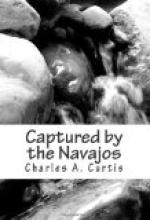“We shall take them, if we can.”
“You see, I was right,” continued Dick to his companion, in Spanish. “They came here to take these horses.”
“Then we better call for the prize, collect our stakes, and leave,” said Juan.
“Where shall we go?” asked Dick. “Arizona’s getting uncomfortable for me, and your kin across the Mexican line don’t love you.”
“Valgame Dios, no! Let’s cross the river and go to San Diego or Los Angeles.”
“Estar bueno. Come with us, youngster,” he added, in English; “and mind ye keep a quiet tongue in yer head or ye’ll have no head to wag it in after ye’ve spoke.”
Henry followed the men to the head of the race-course, where they received their prizes and winnings, and withdrew to the river-bank. There they divided the money and held a conference.
“We’d better cross the river to-night and camp at El Rincon until morning, and then strike for Dos Palmas and the coast.”
“Shall we leave our monte and other stuff in town?” asked Juan.
“No; you stay here and take care of the boy, and I’ll go back and sell out. Anastacio Barela will buy. Look sharp that the young soldier does not send a message by his dog. I heard lots of strange stories of her performances in that line at Prescott. I will bring down something for our supper and the road.”
Dick galloped away, leaving the Mexican and Henry to await his return. As the twilight deepened into darkness the boy’s thoughts grew more and more despondent. He now fully and sadly realized that his disobedience of orders had brought disgrace upon himself, and ruined every chance of recovering the ponies, for once the thieves got well away they were secure from capture.
It was night when Dick returned and told the Mexican that he had made an advantageous sale of their gambling outfit.
“Now, kid, ye kin slope,” he said, addressing the disheartened lad. “Tell the lieutenant that he kin look for us at Hermosilla, on the other side of the Mexican bound’ry. Good-bye.”
Henry hurried away towards La Paz, with Vic close at his heels. There was no occasion for haste, for he felt that nothing in the town could overtake the lost Sancho and Chiquita; still he hurried and stumbled on in the darkness.
“Oh, Vicky,” said the boy, in his misery, stooping to caress his companion, “I ought to be court-martialled and dishonorably discharged from the service for this. I have done very wrong. I have lost our ponies for good.”
The dog licked his hand sympathetically, and then suddenly bounded away, barking, and Henry heard Frank’s voice say:
“Why, Tom, here’s Vic!”
“Thin Sargint Hinery must be near,” said the soldier.
“Yes, I’m here, Frank—and oh, Frank, I’m in such trouble!” And in a curiously jumbled and half-incoherent manner Henry related his afternoon’s experience.
At the conclusion of the recital the three held a consultation as to what was best to be done. Time was precious, and the town was nearly two miles distant.




